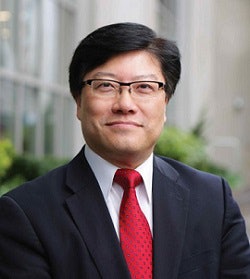Medicine is among the least diverse academic areas in higher education, and Weill Cornell Medicine’s (WCM) efforts to turn that around have led to the appointment of accomplished physician-scientist Dr. Said Ibrahim as the institution’s inaugural senior associate dean for diversity and inclusion.
Renowned for extensive scholarship and award-winning research around combatting disparities in healthcare and access among demographic groups, Ibrahim will lead the Office of Diversity and Inclusion’s efforts to promote initiatives that recruit, nurture and retain doctors, scientists and trainees from women, minority, LGBTQ and other groups underrepresented in medicine. He also will spearhead efforts to unify diversity programs across WCM and cultivate a student body whose diverse range of fresh perspectives and approaches can help foster scientific innovation, eliminate health disparities, improve human health and ensure access for all to the best health care.
 Dr. Said Ibrahim
Dr. Said IbrahimIbrahim, who came to WCM in February as the inaugural chief of the Division of Healthcare Delivery Science and Innovation in the Department of Healthcare Policy and Research, will assume the new post Jan. 2. He will work alongside associate deans of diversity and inclusion Dr. Linnie Golightly and Dr. Rache M. Simmons and assistant deans of diversity and student life Dr. Marcus Lambert and Dr. Elizabeth Wilson-Anstey.
The office’s mission resonates personally with Ibrahim, whose academic pursuits led him to emigrate from Somalia in the mid-1980s. His research has informed national policy at the Centers for Medicare and Medicaid Services. He has had more than 130 publications in top journals and as a clinician-investigator, his work has been federally funded continuously for more than 15 years.
Passionate about equity in healthcare and access and treatment, Ibrahim has studied topics such as the lower preference for surgery among minority patients as a key reason for disparity, access to total knee replacement for Black patients, arthritis and racial disparities in pain, and ethnic and racial differences in total knee anthroplasty in the Veterans Affairs Health Care System.
“Having grown up in East Africa, I understand first-hand how inequalities in healthcare access can significantly affect people’s lives,” he said in an interview with Diverse. “Diversity and inclusion — things that people had fought passionately for during the civil rights movement — made it possible for someone like me to attend medical school in the United States. It’s important to me that we maintain and grow that kind of opportunity for everyone.”
Nationally, only 6 percent of medical school graduates are Black or African American and just 5 percent are Hispanic or Latino, according to the Association of American Medical Colleges.
Diversifying leadership ranks in academic medicine at WCM is a priority of Dr. Augustine M.K. Choi, the Stephen and Suzanne Weiss Dean and Cornell University’s Provost for Medical Affairs. Choi called diversity “essential for the healthcare workforce” and “a core value” of the institution along with education, research and clinical care.
“Bringing together our academic community’s unique perspectives and abilities not only leads to innovation, but also allows us to provide the best care for a diverse population and the best education for a diverse student body,” said Choi. “Dr. Ibrahim is the ideal person to advance this important institutional mission and ensure a rich environment of equality and inclusiveness at Weill Cornell Medicine.”
Ibrahim said WCM’s strong and growing commitment to diversity, equity and inclusion lured him away from the University of Pennsylvania, where he was a professor of medicine for eight years.
 Dr. Augustine M.K. Choi
Dr. Augustine M.K. ChoiHis academic journey in the United States, however, began as a student-athlete. Ibrahim, who stands 6-feet, 8 inches tall, was recruited to Oberlin College to play basketball. The center received a bachelor’s degree in pre-medicine in 1987 and then spent two years as a research assistant at The Wistar Institute of the University of Pennsylvania, one of the nation’s oldest biomedical institutes.
After graduating from the Case Western Reserve University School of Medicine in 1993, Ibrahim did his internship and residency in internal medicine at Brigham and Women’s Hospital in Boston, one of Harvard Medical School’s teaching hospitals.
“I had a wonderful experience and was very well trained,” he said.
Later, Ibrahim attended the Clinical Effectiveness Program at the Harvard T.H. Chan School of Public Health, earning a master’s degree in public health, followed by a master’s degree in business administration from the MIT Sloan School of Management.
WCM’s efforts to champion diversity in medicine science and the healthcare workforce – specifically inclusion of minority, women and economically disadvantaged students – did not begin with the new cabinet-level diversity position and Ibrahim’s appointment to it.
Since 1969, for example, the Travelers Summer Research Fellowship Program has reached more than 1,200 pre-med students who have sought careers as doctors. By 2015, nearly 83 percent of participants had gone on to gain admission to medical school.
Additionally, the Advancing Cornell Career Experiences for Science Students (ACCESS) and Gateways to the Laboratory Summer Program are celebrating 25-year anniversaries as pipelines to doctorate and joint medical-doctorate degrees. Together, they boast 525 alumni.
Choi’s efforts have fueled the momentum since his promotion to dean in January 2017. He has established several diversity initiatives over the last year, including Diversity Week, which debuted in April and will annually showcase cutting-edge academics and initiatives focused on reducing healthcare disparities and enhancing diversity at WCM and nationwide.
Choi also launched the Dean’s Diversity and Healthcare Disparity Research Awards, which provide funding to investigators whose work seeks to improve the health of women and underrepresented minorities and achieve health equity locally and globally. Additionally, the Dean’s Diversity Scholarships are full-tuition scholarships awarded each year to two medical students who are from groups underrepresented in medicine and who have financial need.
The diversity office’s incremental efforts are aimed at building a strong foundation for faculty diversity, including collaboration with the new Mentoring Academy and the Diversity Center of Excellence to enhance women and minority inclusion at all career levels and to increase female representation in high academic ranks and leadership roles at WCM.
The pro-diversity efforts are seeing results. Nearly 20 percent of medical students at Weill Cornell Medical College are from communities underrepresented in medicine, and Weill Cornell Graduate School of Medical Sciences has an average of 25 percent of domestic doctoral students from groups underrepresented in science.
Ibrahim said his position is the “culmination” of Choi’s initiatives, and he feels honored and excited to be part of the mission.
“I’m passionate about diversity and inclusion. It is really an important issue in the 21st century for medicine. Doctors needs to reflect the diversity of people they serve, and I’m so glad to be a part of it.”
LaMont Jones can be reached at ljones@diverseeducation.com. You can follow him on Twitter @DrLaMontJones















